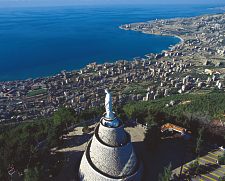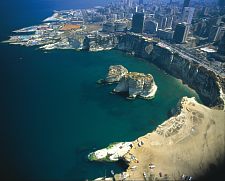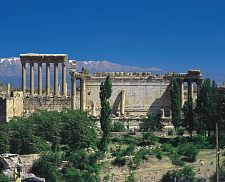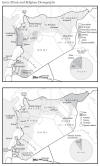|





| |
SON OF A “GONE”
Survival of the Assad Regime
by Elie Al-Chaer
October 15, 2005 | Visit:
AlChaer Blog
THE DEATH OF HAFEZ ASSAD in June 2000 ended what may well have been the longest
"reign" (30 years) of anyone in Damascus since the rise of Islam. Only one
Umayyad caliph (Mu'awiyya) lasted more than 20 years, and the most time any
leader stayed at the top during independent Syria's stormy saga from the 1940s
to 1970 was fewer than five years. Clearly, the father managed to put together a
durable system. Is the son continuing in the same vein?
If Hafez Assad bore a resemblance to Don ‘Vito’ Corleone in "The Godfather" –
Mario Puzzo’s Mafia story - then his heir, Bashar, could be the don's son. Like
Michael Corleone, Bashar Assad is an improbable successor, who promised to make
the family enterprise legitimate but who operates in an environment that
obstructs any such transformation.
 More
than five years into Bashar's reign, there is still little consensus about his
beliefs on important issues or how much real power he exercises. His decision to
withdraw Syrian troops from Lebanon by the end of April is a hopeful, but not
conclusive, sign. With Syria increasingly isolated and facing unprecedented
pressure, his father, too, might have found a tactical withdrawal to be
expedient. Hafez Assad's foreign policy was ever a shrewd mix of confrontation
and co-operation. More
than five years into Bashar's reign, there is still little consensus about his
beliefs on important issues or how much real power he exercises. His decision to
withdraw Syrian troops from Lebanon by the end of April is a hopeful, but not
conclusive, sign. With Syria increasingly isolated and facing unprecedented
pressure, his father, too, might have found a tactical withdrawal to be
expedient. Hafez Assad's foreign policy was ever a shrewd mix of confrontation
and co-operation.
Bashar, unlike his father, has been exposed to western traditions, and many
westerners hoped he would be a reformer. But not much reform has happened. It is
still unclear whether the younger Assad is held back by the Old Guard - the
entrenched power structure bequeathed to him by his father - or whether the
tortoise-like approach fits his own predilections. Three conflicting images of
Bashar as national leader currently dominate analytic debates and policy
arguments about Syria. These may be summarily described as:
1) “Bashar as closet reformer”: he recognizes Syria’s backwardness, wants to
reform the system he inherited from his father, and seeks to improve Syria’s
relations with the West, particularly the United States. However, Bashar is
constrained by his continuing need for support from an old guard of senior
officials in the government and security apparatus.
2) “Bashar as loyal son”: he is a force for continuity and stasis (if not
retrogression) in Syrian domestic and foreign policy. A thoroughgoing product of
the system his father built up, whose principal goal is to protect the core
constituencies of the Assad regime and preserve the main elements of his
father’s foreign policy. This makes him very much part of the “problem” in
Syria; and in no way he can be considered a prospective part of the solution.
3) “Bashar as neophyte”: he is a callow and inexperienced leader who is
probably not up to the job of being president of Syria. Those who see Bashar
through this prism argue that he does not have a real vision - whether reformist
or status quo in orientation - for Syria’s future or a fully thought-through
foreign policy agenda.
Each of these images carries its own implications for U.S. policy; the lack of
analytic consensus thus exacerbates the lack of consensus on the appropriate
course for policy. On the whole, the American administration is disinclined to
give him the benefit of the doubt. Syria has long been an awkward customer: a
smallish, militarily weak country with no resources to speak of but with a
disproportionate ability to annoy. It has been on the State Department's list of
states that sponsor terrorism since 1979, it is said to pursue weapons of mass
destruction (WMD) in the shape of chemical weapons and it has little truck with
democracy. Yet it enjoys, until now, more or less normal diplomatic relations
with the United States and, so far at least, suffers only mild economic
sanctions.
According to Flynt Leverett - former director of Middle Eastern affairs at the
National Security Council in Washington and author of the book “Inheriting
Syria: Bashar’s Trial by Fire”, the American policy towards Syria is incoherent.
The administration simply cannot decide what to do. One faction considers Syria
ripe for coercive regime change. Another would rather continue ratcheting up
economic, political and rhetorical pressure. Yet another believes that Syria
should be offered a carrot-and-stick package similar to that which persuaded
Libya to change some of its nastier ways or as Mr. Leverett calls it
“conditional engagement.”
The Neo-Conservative Approach
For the neoconservatives in Washington who have the ear of Mr. Bush, Syria is
ripe for regime change. More than most Arab states, Syria’s population is a
“fragile mosaic” of ethnic and sectarian communities. Arguably, among Arab
states, only Iraq and Lebanon present comparable arrays of distinct communities.

Ninety percent of Syria’s population is Arab in ethnicity; another roughly 9
percent is Kurdish, with Armenians, Circassians, and Turkomans filling out the
mix. Syria’s Arab majority, however, is riven with sectarian cleavages that
diminish its coherence as a definer of individual identities. Sunni Muslims are
74 percent of Syria’s overall population, but Kurds represent probably 8 percent
of that figure, reducing the core Sunni Arab majority to roughly two-thirds of
the populace. Another 16 percent of the population, while Arab in ethnicity,
consists of various offshoots of Shi‘a Islam -Alawis, Druze, and Isma‘ilis. The
Alawis are by far the largest community in the category of non-Sunni Muslims
(11–12 percent of the overall population). Christians, of various Orthodox and
Uniate traditions and the Latin Rite, along with a smattering of Protestants,
make up another 10 percent of the population. Syria’s small but historic Jewish
community has all but disappeared as a result of emigration in the early 1990s.
These ethnic and sectarian cleavages have for centuries been the source of
considerable social tension in Syria. Even today, there are palpable,
historically grounded antagonisms between the Sunni Arab majority and non-Sunni
communities. Islamic revivalism among Sunni Muslims, while clearly a region-wide
phenomenon during the last three decades or so, has had special resonance in
countries like Syria, where a Sunni majority is dominated by minorities (The
Alawis and their allies).
Overthrowing the Assad regime will kill two birds with one stone:
1) It will calm the Sunni uprising in Iraq and present a possible solution –
alternative grounds - for the insurgency in Iraq. The Iraq insurgency has been
for the most part run by Arab Sunnis angry over the loss of control to Shi’as
and Kurds. A regime change in Syria at this juncture would give the Sunnis in
both Iraq and Syria a new objective to fight for and shift their focus from Iraq
– a lost cause to Sunnis by all means – to Syria, the country with a majority of
Sunnis crushed, time and again, by the Assad regime.
2) A Sunni regime in Syria would tighten the belt around Shiite Iran (Turkey,
Syria, Jordan to the west; Afghanistan and Pakistan to the East – countries with
Sunni majorities) and limit its ability to interfere with regional politics or
to threaten Israeli interests therein directly or by proxy.
For many, it may have seemed bizarre for Bashar Assad, against all odds and
against the advice of his “old guard” (including Ghazi Kanaan, the Alawi
interior minister of Syria who allegedly committed suicide), to force an
extension of the Lebanese President’s term – Emile Lahoud, a Maronite Christian
and a staunch ally of the Assad regime. Lahoud’s opponents in Lebanon also
contend that the Assad regime may have ordered the assassination of Rafiq Hariri
- Lebanon’s Sunni former PM. These two tactical steps, while seemingly
ill-conceived by Assad, may have been part of a survivalistic strategy by the
young leader to prevent the rise of a Lebanese regime beyond his control and
under the leadership of a powerful Sunni.
The Conditional Engagement
On the other hand, proponents of a “conditional engagement” of Syria argue that
the situation in Iraq would be better helped if Syrians are persuaded to
sever their ties to terrorist groups. According to them, the judgment on Bashar
should take the timing into account. He took over in June 2000, which marked the
start of a particularly stormy period. The peace track with Israel had
collapsed, the Palestinian intifada was about to explode and the terrorist
attack on America was just over the horizon. The young Assad put stability
first, believing, as the Middle East's monarchical leaders find it easy to
believe, that there was no great hurry, let alone a fixed electoral term, to
bring about change.
Any Syrian change for the better - whether it is more openness at home or less
support for militant forces abroad - needs the basis of a sounder
American-Syrian relationship or "conditional engagement". In the 1990s the
framework for Syrian-American relations was the Syrian-Israeli peace process.
But that path is blocked. Syria insists that the first step must be Israel's
reaffirmation of the "Rabin deposit" (the late Yitzhak Rabin's conditional
willingness to withdraw fully from the Israeli-occupied Golan Heights). But
Ariel Sharon, Israel's current prime minister, will reaffirm no such thing.
Conditional engagement, nowadays, would mean that Syria, in return for a more
understanding American attitude, should agree to end its involvement with
terrorism. If this means stricter control of the Syria-Iraq border, a bargain
could probably be struck: Syria was careful, after September 2001, to show
itself as being on the right side of the "war on terrorism", although it
received few American thanks for doing so. But "terrorism", in American
parlance, includes Hezbollah, the Syrian-supported Shi’a Muslim Lebanese
party-cum-militia. The UN resolution that last year called on Syria to get out
of Lebanon also demanded the disarming of Hezbollah, the only militia to be
permitted to keep its arms at the end of Lebanon's 15-year war (1975-1990). The
unwritten text was clear: Syria should not be allowed to get away with keeping
an armed proxy in Lebanon.
This is more problematic. For a start, Bashar has a closer relationship with
Hezbollah's leader, Hassan Nasrullah, than his father had. Hezbollah itself puts
faith in the mutual need that Syria and Hezbollah have of each other. Sheikh
Naim Qassem - a founding member of Hezbollah in 1982 and its deputy
secretary-general since 1991 - in his book “Hizbullah: The Story from Within”,
claims confidence in the solidity of the Syria-Hezbollah link.
Sheikh Qassem insists that Hezbollah, the party of God, should be seen as an
Islamic party first and a resistance group second; its ideological commitment is
what spurs it to refuse occupation. Though Hezbollah takes credit for throwing
Israel out of Lebanon, the repercussions of Israeli occupation still continue,
he argues, in the refugees, the infringement of airspace, the appropriation of
water resources, the retention of detainees and an Israeli presence in the
sliver of land known as the Shebaa Farms. But what would Hezbollah do if Lebanon
was completely liberated and all detainees were finally freed? Keep guessing,
replies the wily sheikh, which may also be Bashar Assad's approach.
Riding out the Storm
Monitoring the US reaction to the report of Judge Detliv Mehlis - the UN
investigator in the Hariri assassination – is key to determining whether the
Bush administration will pursue a “neo-con” or a “conditional engagement” move
toward the Assad regime. The situation in Iraq is difficult to control and Mr.
Bush’s numbers are falling in the polls; a dramatic step is needed to shift the
attention off Iraq and stop the bleeding at home. This dramatic step, analysts
agree, will necessarily include the push for “democracy” in yet
another bastion of dictatorship in the Middle East. Which venue will it pursue?
The UN-Mehlis report holds the answer.
Bashar Assad faces a monumental challenge in keeping his regime together under
these various pressures. Nevertheless, analysts agree that it would be wrong to suggest that the
regime in Syria is in a state of collapse. But if the country is to ride out the
storm, then the Damascus leadership can not continue to ignore its
responsibilities in the new world order. A Syria indifferent to the needs of the
world may have served Assad's father but today is no longer an option.
|